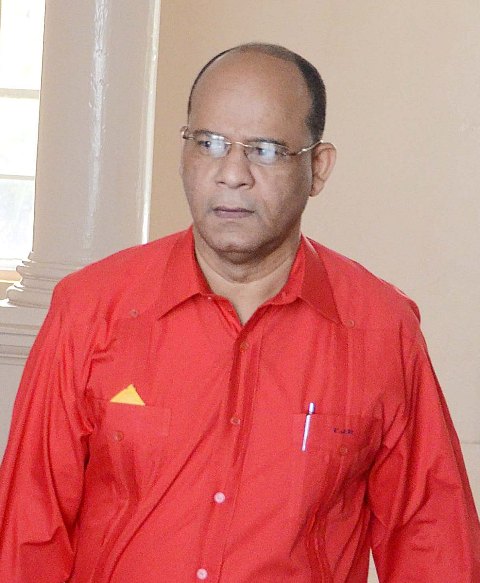President Donald Ramotar yesterday sought to assure foreign nationals living and working in Guyana that his administration is trying to minimise delays in the processing of immigration applications and work permits and also to ensure their safety.
Ramotar was at the time meeting with foreign immigrants and non-immigrants at a town hall-style discussion at the Guyana International Conference Centre, where he said that the country’s immigration policy is both inclusive and safe and that the government would not tolerate the targeting of any groups.
“As long as you are doing legitimate business in Guyana, you will be welcomed in our country,” he declared to those gathered at the full conference centre.

Ramotar and Home Affairs Minister Clement Rohee, who was also present at the meeting, heard the frustrations of those gathered and tried their best to answer questions in relation to processing time for paperwork and requirements of immigration paperwork. Many persons complained about the extremely long waiting time to receive information on the status of immigration paperwork and even national ID applications from the ministry. Other persons noted that there was discontinuity between work permits and visas, since work permits were being issued for three years, while visas are being issued for one year.
The president acknowledged problems with processing immigration applications. “I have heard complaints about some of the difficulties you had; some of the things about getting permits, work permits, and we have been constantly working to improve that,” he said, while explaining that th
e government is actively working on minimising delays. He added that the immigration policy was working in such a manner “to make it almost automatic” that when a person spends seven years in Guyana that they process “very, very quickly” their applications for citizenship.
He also noted concerns about the targeting of Chinese immigrants by criminals. “I know that there was a concern in one group of people… the robbery statistics will probably show that more of our Chinese brothers and sisters were being attacked. Our security forces are well aware of that,” he further said, while noting that the Home Affairs Ministry was putting a policy in place to ensure that this type of action was not in Guyana’s future.
Chinese Ambassador Zhang Limin also cited immigration delays and security as being “prominent” areas of concern for Chinese immigrants. “To be frank, the local Chinese people face some difficulties in their lives and at work. For instance, the prominent ones are processing speed for their applications for extension of stay and the safety of their lives and property,” he explained.
But the ambassador added that compared to the overall bilateral, friendly cooperation, these difficulties are “insignificant” and could be absolutely overcome.
He noted too that many Chinese immigrants have intentions of residing in Guyana permanently. “In my opinion, thousands of Chinese people would not have travelled across oceans and settled down in Guyana to further their careers without the open and inclusive immigration policy of the Government of Guyana and without the warm acceptance of the Guyanese people,” he observed.
He added that even before and after his arrival in Guyana, many of his friends from business circles expressed their interest in investing in Guyana and they asked him about the local immigration policy. “I briefed them on the relevant policies and the great developmental potential of Guyana,” he said, while later adding that he hoped in the future Guyana will work to provide Chinese immigrants with a safer environment and more facilities to further develop the two countries bilateral trade and economic cooperation.
While the Chinese ambassador reflected on the safety of his immigrant countrymen and women, the Brazilian Ambassador Luiz Gilberto Seixas de Andrade focused on rewarding law-abiding immigrants. “The Brazilian Embassy is aware that most of these immigrants are law abiding and they have given a significant contribution to the spectacular expansion of the mining activities in Guyana. Unfortunately, some of these immigrants may be violating Guyanese laws— working without the working permits or engaged in illegal mining or both,” he noted. As a result, he suggested that Guyana and Brazil work together for work permit concession due to the large Brazilian immigrant population in Guyana and vice versa and the fact that the two countries had a longstanding relationship that was vested in continued cooperation.
Meanwhile, Rohee noted that both the Chinese and the Brazilians ambassadors made valid contributions. He said that the issues they addressed were one of the main reasons that “the regularising to all foreign nationals was extremely important.”
He noted that Guyana was the only Caricom country with such an open immigration policy and that it was based on fostering a continuous stream of development by enticing skilled workers.
Rohee and ministry staff also took the names of all those affected by various issues to look into matters more closely.




